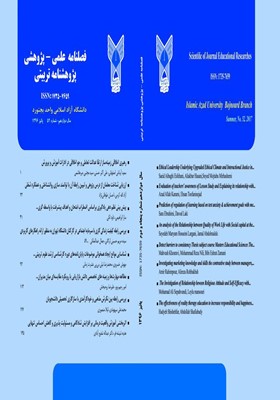اثربخشی آموزش واقعیت درمانی بر افزایش شادکامی و مسئولیت پذیری و کاهش احساس تنهایی
محورهای موضوعی : علوم تربیتیهدیه شیشه فر 1 , عبدالله شفیع آبادی 2
1 - دانشگاه آزاد واحد رودهن
2 - استاد گروه مشاوره دانشگاه علامه طباطبایی تهران
کلید واژه: شادکامی, مسئولیتپذیری, احساس تنهایی, واقعیتدرمانی,
چکیده مقاله :
هدف پژوهش حاضر تعیین اثربخشی واقعیتدرمانی بر افزایش مسئولیتپذیری و شادکامی و کاهش احساس تنهایی کارکنان موسسه مدرسان شریف بود. روش پژوهش، شبه آزمایشی با طرح پیشآزمون- پسآزمون، گروه کنترل و پیگیری دوماهه بود. جامعه آماری این پژوهش، شامل 190 نفر از کارکنان موسسه مدرسان شریف شهر تهران در سال 1395 بود که با روش نمونهگیری تصادفی خوشهای و در دسترس، از میان آنها تعداد 31 نفر انتخاب و در دو گروه 15 نفری آزمایش و 16 نفری کنترل جایگزین شدند و در سه مرحله، به پرسشنامههای احساس تنهایی راسل و همکاران (1978)، مسئولیتپذیری گاف (1987) و شادکامی آرگیل و همکاران (1989) پاسخ دادند. سپس گروه آزمایش به مدت 7 جلسه نود دقیقهای تحت آموزشهای واقعیتدرمانی قرار گرفتند و گروه کنترل مداخلهای دریافت نکرد. برای تجزیه و تحلیل دادههای به دست آمده، از روش آماری تحلیل واریانس چندمتغیره و تحلیل کوواریانس استفاده شد. نتایج حاکی از کاهش معنادار نمره احساس تنهایی و افزایش معنادار نمره مسئولیتپذیری و شادکامی در گروه آزمایش در مقایسه با گروه گواه در مرحله پسآزمون و پیگیری بود. از آنجا که اجرای برنامه آموزش واقعیتدرمانی به صورت گروهی منجر به افزایش شادکامی و مسئولیتپذیری و کاهش احساس تنهایی کارکنان میشود، از این برنامه میتوان بهعنوان برنامهای مفید و موثر برای کارمندان موسسات و ادارات استفاده کرد.
This research investigated the effectiveness of reality therapy education to increase responsibility and happiness as well as to decrease the feeling of loneliness in the staff of the institution Modarresan-e Sharif. A quasi-experimental method with pre- test and post-test, control and follow up designs was employed. The statistical population included all the employees of the institution Modarresan-e Sharif of Tehran (N=190) in year 2016. From this population, 31 employees were selected by cluster and available sampling and assigned to an experimental and a control groups having 15 and 16 people respectively. In the pre-test and post- test & follow up, the staff of both groups completed the questionnaires for feeling of loneliness (Russel, 1996), responsibility (Gaff 1957), and happiness (Argyl 1989). After, the experimental group received 10 sessions of 2 hours of reality therapy training and the control group not received intervention. To analyze the data obtained, a multivariate analysis and a covariance analysis were used. The results indicated a meaningful reduction in the post-test feeling of loneliness score as well as a significant increase in the responsibility and happiness scores for the experimental group in comparison to the control group and the difference remained meaningful in the follow-up. Since the reality therapy training program within a group leads to increase responsibility and happiness as well as to decrease the feeling of loneliness in the staff, it can be used as a helpful and efficient program for Employees institutions and agencies.
_||_


